Wise words for masons. Uncover timeless wisdom from King Solomon to Albert Pike in our latest Masonic Miscellanies, a treasure trove of insights for Masons.
Journey through the ages and glean inspiring sayings, reflecting on their profound influence on Masonic principles. An enriching read for the enlightened.
King Solomon

‘Solomon writing Proverbs’, Gustave Dorés illustrated ‘Book of Proverbs’
IMAGE LINKED: wikimedia Attribution 4.0 International (CC BY 4.0)
The Book of Proverbs
1 The proverbs of Solomon son of David, king of Israel:
2 for gaining wisdom and instruction;
for understanding words of insight;3 for receiving instruction in prudent behaviour,
doing what is right and just and fair;4 for giving prudence to those who are simple,
knowledge and discretion to the young—5 let the wise listen and add to their learning,
and let the discerning get guidance—6 for understanding proverbs and parables,
the sayings and riddles of the wise.7 The fear of the Lord is the beginning of knowledge,
but fools despise wisdom and instruction.
Throughout the Book of Proverbs, Solomon urges us to be wise, to ‘get wisdom’.
Proverbs 4:5
Get wisdom, get understanding: forget it not; neither decline from the words of my mouth.
Proverbs 19:8
He who gets wisdom loves his own soul: The possession and pursuit of wisdom is so good and helpful to us that we can and should get wisdom simply out of self-interest. In so doing we love our own soul, our own life.
Proverbs 16:16
How much better is it to get wisdom than gold! and to get understanding rather to be chosen than silver!
Proverbs 8:32 – 35
Now therefore hearken unto me, O ye children: for blessed are they that keep my ways.
Hear instruction, and be wise, and refuse it not.
Blessed is the man that heareth me, watching daily at my gates, waiting at the posts of my doors.
For whoso findeth me findeth life, and shall obtain favour of the Lord.
Proverbs 24:3-4
By wisdom a house is built, and through understanding it is established;
through knowledge its rooms are filled with rare and beautiful treasures.
Proverbs 24:27
Put your outdoor work in order and get your fields ready; after that, build your house.
Johann Wolfgang von Goethe
German Novelist, Scientist and Freemason

Johann Goethe. By Joseph Karl Stieler – Transferred from nds.wikipedia to Commons..org by G.Meiners at 12:05, 15. Okt 2005
IMAGE LINKED: wikimedia Attribution 4.0 International (CC BY 4.0)
The Hidden Meaning
A Mason’s ways are
A type of existence,
And his persistence
Is as the days are
Of men of the world.
The future hides in it
Good hap or sorrow,
We pass through it-
Naught there abides in it
Daunting us- onward.
And silent, before us,
Veiled the dark portal,
Goal of all mortal;
Stars silent rest over us,
Graves under us silent.
But heard are the voices-
Voices of the sages
Of the world and the ages-
Choose well, your choice is
Brief, but yet endless.
Here eyes do regard you
In eternity’s stillness,
Here is all fullness,
Ye brave, to reward you,
Work and despair not.
In Goethe’s dying moments, his last words were, “More Light!”
Albert Pike
Masonic Author

Albert Pike. Original image Library of Congress Digital Collection
IMAGE LINKED: wikimedia Attribution 4.0 International (CC BY 4.0)
Man is accountable for the uprightness of his doctrine, not for the rightness of it.
Influence of man over man is a law of nature, and the conquest of mind over mind is the only conquest worth while.
The free country in which intellect and genius rule, will endure. Where they serve, and other influences govern, the national life is short.
Select thinkers for legislators; avoid gabblers. Wisdom is rarely loquacious.
Deeds are greater than words. They have a life, mute, but undeniable; and they grow. They people the vacuity of Time, and make it worthy.
Nothing is really small. Every bird that flies carries a thread of the infinite in its claws.
Life has its ills, but is not all evil. If life is worthless, so is immortality.—Morals and Dogma.
On his deathbed, when unable to speak any longer, Albert Pike beckoned for a pencil and paper, with which he wrote his last words. The pencil and paper are framed and preserved in the House of the Temple at Washington.
What he wrote was as follows:
“Shalom: Peace — that comes with blessing to care-fretted, weary men when death’s dreamless sleep ends all suffering and sorrow.”
Roscoe Pound
American Legal Scholar and Masonic Author

Roscoe Pound. Public Domain image
IMAGE LINKED: wikimedia Attribution 4.0 International (CC BY 4.0)
On Study:
Masonic knowledge seems to me to involve five points: (1) Ritual; (2) History; (3) Philosophy; (4) Symbolism; (5) Jurisprudence.
I think we cannot insist too strongly that knowledge of the Ritual is the Foundation of all Masonic knowledge.
The first thing which the student should do is to learn the work of the Craft degrees thoroughly. He will then be in a position to appreciate what he reads and to ask questions as he reads.
As to History, I should recommend him to begin with Gould’s Concise History. I know of nothing so good. When he has read this, it will be time enough for him to begin, if he has time, with the original sources of our information.
CHARGE GIVEN TO THE CANDIDATE BY HIS FATHER
After the Candidate Had Received the “Third Degree.”
MY SON — Tonight you become a member of an order — not only of friends but of brothers. In your after-life as you master its teachings, and experience its good influences, you will have a great mental growth.
Masonry fosters only the right doers; its principles, its teachings, its mysteries — all tend to the elevation of man.
Masonry gives maturity to the good character, and character may be likened to a universal bank; The deposits that are made in the bank of character bear an eternal interest; no thief can steal them, no panic can dissipate them.
The life of him who is pure, just, honorable and noble, finds within the tenets of Masonry loyal protection “from the evil intentions of our enemies.”
We believe that you will be true and faithful to the teachings of Masonry, and we trust that you will so live that your words and your actions will be such as to brighten the memory of all the good men who have stood where you and I now stand — amid friends and amid brothers.
You are the son of a Mason who reveres Masonry’s teachings and stands uncovered in the presence of its sublime mysteries.
If you will have your conduct in harmony with the principles of Masonry, you will aid my remaining years, to pass in peaceful satisfaction.
You are not only my SON but you are also my BROTHER; and believing that you will always prove yourself as being worthy of having been this evening, “raised to the sublime degree of a Master Mason,” I hope to be steadied by your arm as my SON and as my BROTHER when I depart on the journey whose goal is the realm of silence.
FRANK BRAYTON.
ARTHUR BRAYTON.
Lyons Lodge, Number Ninety-Three, Lyons, Iowa
Text Sources:
The Builder, Vol 3, 1915
Book of Proverbs
Recent Articles: Masonic Miscellanies
 Masonic Miscellanies - The Amulet of the Ladder Explore the cosmic significance of the Ladder in ancient Egyptian mythology through Wallis Budge's "Egyptian Magic." Discover how this profound symbol bridges the mortal and divine, encapsulating the Egyptians' fervent afterlife aspirations with a blend of myth, magic, and material culture. Dive into the celestial ascent of Osiris and mortal souls. |
 Masonic Miscellanies - Adulterine Gilds Guilds, the associations that shaped medieval European society, were more than just organizations of artisans and merchants. They played a vital role in the economic and social development of towns and cities. This exploration delves into the intriguing concept of adulterine gilds and their interconnectedness with guilds, offering insight into the significance of legal authorization and recognition in medieval Europe. |
 Masonic Miscellanies - Masonic Orb Discover the fascinating world of Masonic ball watch fobs, intricately crafted with tiny pyramids that form a cross when opened. These decorative accessories were all the rage in the late 1800s and early 1900s, and they still hold a certain allure today. Explore the different varieties and symbols found on these unique pieces that carry deep Masonic meaning. |
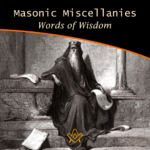 Masonic Miscellanies – Words of Wisdom Uncover timeless wisdom from King Solomon to Albert Pike in our latest Masonic Miscellanies, a treasure trove of insights for Masons. Journey through the ages and glean inspiring sayings, reflecting on their profound influence on Masonic principles. An enriching read for the enlightened. |
 Masonic Miscellanies - Symbolism of the Right Hand Unlock the enigmatic realm of Freemasonry as we delve into its age-old symbols, rituals, and philosophies. This thought-provoking exploration, drawn from Mackey's Revised Encyclopedia of Freemasonry, focuses on the iconic 'right hand' symbol - its rich history, universality, and profound significance. |
 Masonic Miscellanies - Order of the Secret Monitor Unveil the mystery of Freemasonry with 'The Order of the Secret Monitor'. Discover this lesser-known appendant order, its unique rituals, and the profound teachings it offers. Explore the bonds of friendship and brotherhood it fosters, all wrapped in an intriguing cloak of mystery. Your journey into the depths of Masonic wisdom begins here. |
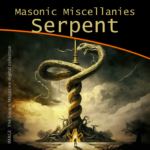 Masonic Miscellanies - The Symbol of the Serpent As a symbol, the serpent obtained a prominent place in all the ancient initiations and religions. |
 Masonic Miscellanies - The Four Veils in Royal Arch Masonry What are the four veils in Royal Arch Masonry? And what is the 'Ceremony of Passing the Veils'? Although common throughout Scotland, Ireland and the United States, it is mostly unknown in England, presently only worked in the Province of Bristol. ( and by dispensation ) |
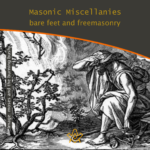 Masonic Miscellanies - Bare feet and Freemasonry A candidate for initiation into a Masonic Lodge often finds the requirements which he/she must fulfil somewhat odd. The mode of preparation often remains a puzzle, since the ritualistic explanation is not offered in full. Why are we 'slipshod' or "bare-footed" in Masonic Ritual? |
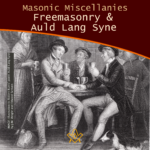 Masonic Miscellanies – Freemasonry and Auld Lang Syne Millions of people throughout the world will sing Auld Lang Syne to see out the Old Year. Few will know all the words, fewer still know what they mean, or that there is a link to Freemasonry. |
 Masonic Miscellanies - The Mosaic Pavement - why mosaic, why pavement? We are all familiar with the black and white chequered flooring of the Masonic lodge but where did it originate? There are a few theories… |
 Masonic Miscellanies – Masonic Master's Carpets Have you got a magic "Masonic Master's Carpet" in your lodge? I say 'magic' with my tongue firmly in my cheek because (as far as I know) these fabulous works of art don't bestow any mystical powers but can bestow some educational ones! However, considering their possible value today, they may magic up some interest (or funds). |
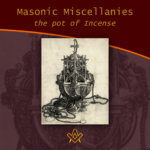 Masonic Miscellanies – The Pot of Incense Just when the pot of incense became an emblem of the third section of the Sublime Degree can not be stated with certainty. It is, apparently, an American invention or addition. But what does it symbolise? |
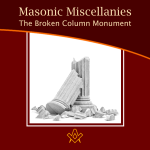 Masonic Miscellanies - The Broken Column Monument The story of the broken column was first illustrated by Amos Doolittle in the "True Masonic Chart" by Jeremy Cross, published in 1819. |
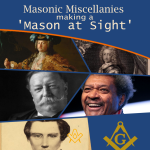 Masonic Miscellanies - Making a 'Mason at Sight' What does it mean to make a 'Mason at sight', and who was made one? |
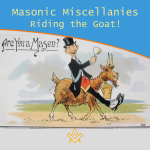 Masonic Miscellanies - Riding the Goat! Many Freemasons will have come across the phrase 'riding the goat', and will no doubt have been the butt of a joke about it (sorry, I couldn't resist!) But what does it mean and where did the phrase come from? |
 Masonic Miscellanies - What are the 'three dots'? Three dots or points in an upright triangular shape ∴ is most commonly known as the 'therefore' sign – so why is it used in Freemasonry? |
 Masonic Miscellanies - Keep Within Compass This month we discover a series of allegorical prints warning us to "Keep within Compass and you shall be sure, to avoid many troubles which others endure." |
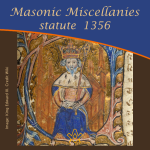 Masonic Miscellanies - statute 1356 Further to the reference in the article – The Builders - 6 - Free-Masons 'a statute was enacted against the Free-masons in 1356' – Regulations for masons who are hewers, on the one hand, and the light masons and setters on the other. |
 Masonic Miscellanies - An Anti-Masonic 'Apron'? The Anti-Masonic 'Apron' was created during the 1832 Presidential election in USA. It was not Ani-masonic. And it was not an apron. Read on to find out what and why it was created. |
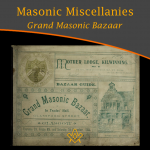 Masonic Miscellanies - Grand Masonic Bazaar (1895) Grand Masonic Bazaar (1895); to raise funds to clear the debt incurred by “Mother Kilwinning” in rebuilding their Lodge. |
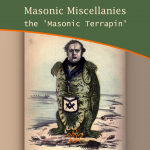 Masonic Miscellanies - the 'Masonic Terrapin' A satirical book from 1851 includes a bizarre caricature of a 'Masonic Terrapin' - all I can say is 'read on'… |
 Masonic Miscellanies - Masonic Bookplates You probably know what a bookplate is for, but did you know that the earliest known book mark/label dates from the reign of Amenhotep III in Egypt around 1391−1353 BCE?! |
 Masonic Miscellanies - Freemasonry & Bees Freemasonry & Bees - what's the buzz? The bee was among the Egyptians the symbol of an obedient people, because, says Horapollo, of all insects, the bee alone had a king. |
 Masonic Miscellanies - The mystery of the Tattooed Freemason In 1894, the body of a drowned man was found in the Bay of San Francisco - what they discovered was amazing. |
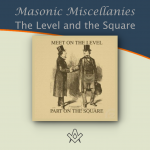 Masonic Miscellanies - The Level and the Square (A Poem) The Level and the Square (A Poem) - "We meet upon the Level, and we part upon the Square – |
 Masonic Miscellanies - The Mystic Tie What is the 'Mystic Tie'? Clue: it's not an item of neckwear! |
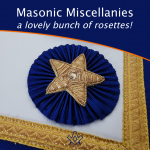 Masonic Miscellanies - A lovely bunch of rosettes! Where did the origin of the use of rosettes on Masonic aprons come from ? |
 Masonic Miscellanies - The Lodge of Sorrow The Lodge of Sorrow - Extracted General Ahiman Rezon, by Daniel Sickles, [1868] |
 Masonic Miscellanies - Memento Mori Memento Mori - a Masonic reminder to make your mark on the world |
 Masonic Miscellanies - A closer look at the Level and the Plumb-rule A closer look at the Level and the Plumb-rule |
 Masonic Miscellanies - The Symbolism of the Gloves The Symbolism of the Gloves and why Freemasons wear white gloves |
 Masonic Miscellanies - Will the real James Anderson please stand up? Will the real James Anderson please stand up? |
 Masonic Miscellanies - The Legend of the Third Degree The most important and significant of the legendary symbols of Freemasonry is, undoubtedly, that which relates to the fate of Hiram Abif. |
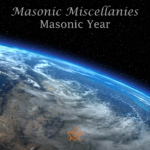 Masonic Miscellanies - Masonic Calendar Why do Freemasons use different 'years' to our regular calendar? |
 Masonic Miscellanies - What is a 'Lewis'? The English word 'Lewis' is a term belonging to operative Masonry, and signifies an iron cramp, which is inserted in a cavity prepared for the purpose in a large stone. |
 Masonic Miscellanies - From J.S.M. Ward Ever wondered why masons had to be 'free' or why we have a Tyler? |
masonic knowledge
to be a better citizen of the world
share the square with two brothers

click image to open email app on mobile device








